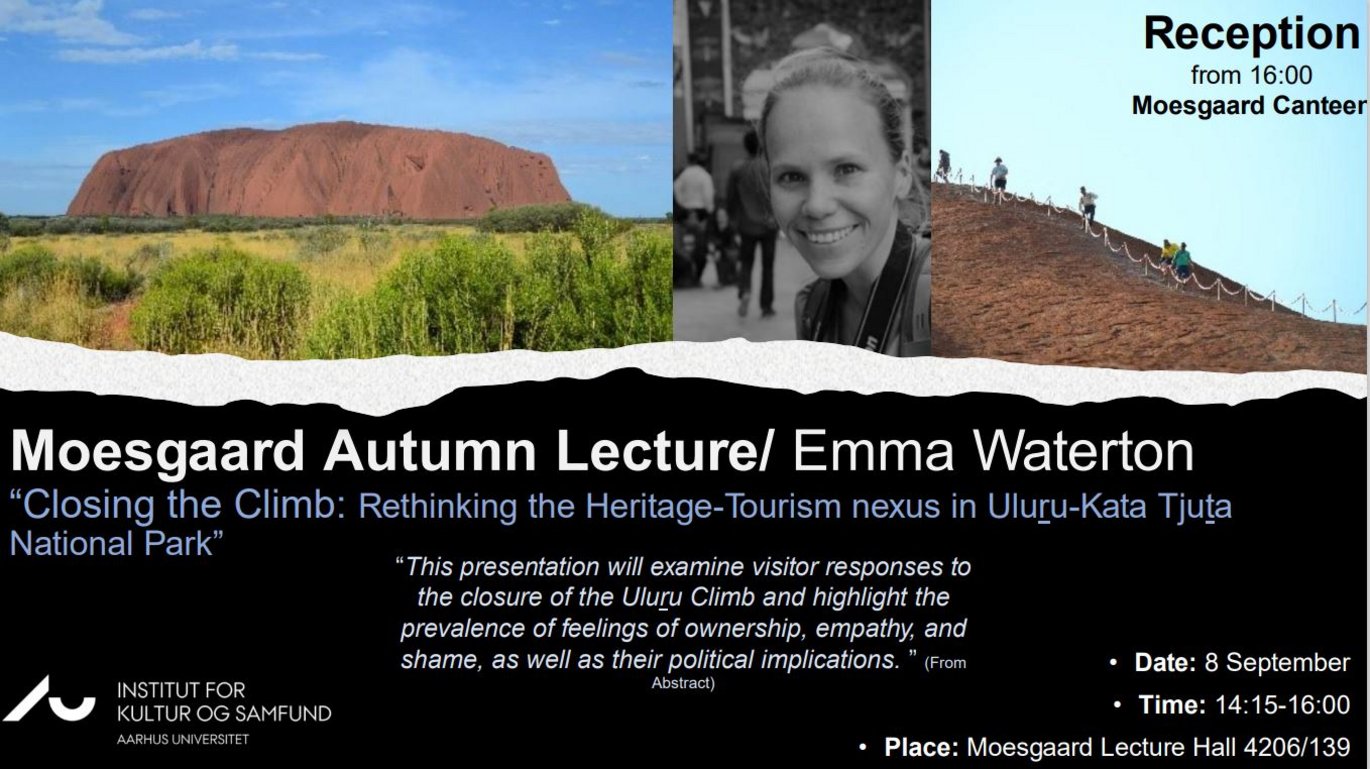Moesgaard Autumn Lecture 2023: Emma Waterton
Closing the Climb: Rethinking the Heritage-Tourism nexus in Uluru-Kata Tjuta National Park

Oplysninger om arrangementet
Tidspunkt
Sted
Moesgaard Lecture Hall 4206/139
Arrangør
Moesgaard Autumn Lecture with Emma Waterton, Leverhulme International Professor at the University of York
The Moesgaard Autumn Lecture welcomes our new MA students of Sustainable Heritage, Human Security, Archaeology and Anthropology to Moesgård Campus, marking the end of their Introduction Week. Moesgaard Lectures are organised by the Research Programmes of Anthropology (RPA) and Materials-Culture-Heritage (MCH) and features speakers whose cross-disciplinary scholarship help us reflect and engage with the research fields and disciplines at Moesgård.
Abstract
First inscribed on the World Heritage List in 1987 under natural criteria and later renominated as a cultural landscape in 1994, Uluru-Kata Tjuta National Park has long been recognized for its exceptional values. Perhaps unsurprisingly, this recognition also led to its establishment as a major tourism draw of international standing. Located close to the geographic centre of Australia, the park -- and 348-metre-high monolith located within it -- is often described as the country’s ‘red heart’, thereby revealing an ongoing settler obsession with claiming it both physically and symbolically. Despite Anangu regaining ownership of the park in 1985 and persistently trying to deter visitors from climbing Uluru, many continued with the practice, albeit in gradually decreasing numbers. In October 2019, some ninety years after tourists first started climbing it, the Uluru Climb was permanently closed. Drawing on data collected in November 2012 and May 2019, this presentation will examine visitor responses to the closure of the Uluru Climb. It will highlight the prevalence of feelings of ownership, empathy, and shame, as well as their political implications. In closing, it will point to an ethic of relationality as key to the mobilisation of the feelings, emotions and affects necessary to transform the outlook of visitors in the context of ongoing reconciliation debates in contemporary Australia.
Biographies
Speaker: Emma Waterton (she/her) is a Leverhulme International Professor at the University of York, where she directs the Heritage for Global Challenges Research Centre. Emma’s research is located in the fields of heritage studies and cultural geography, where she works to challenge the systems, structures and institutions of power that continue to shape heritage, both in the UK and internationally. She is particularly interested in the following: the interface between heritage, identity, memory and affect; anti-colonial politics and alternatives to the logics of colonialism; migrant heritage-making; and climate justice in the Anthropocene.
Co-Author: Vanessa Whittington is a Doctoral Candidate with the Institute for Culture and Society, Western Sydney University, and a Sessional Academic with various Sydney tertiary institutions. Her Doctoral research investigates visitor responses to recognised places of Aboriginal cultural heritage in Australian protected areas. She has published in the areas of housing, homelessness and social policy; heritage and contested memory in a settler-colonial context; the marginalisation of working-class urban heritage, world heritage discourse and gender and settler-colonialism within Australian protected area tourism.
